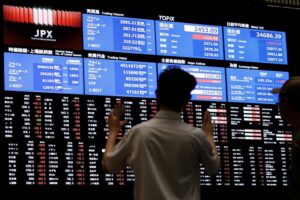Asian Market Update: Fed Decision Ripples Through Global Economy
Asian financial markets are currently reacting to the recent announcements by the U.S. Federal Reserve, which has led to a noticeable downturn in stock values while bond yields are on the rise. The dollar is gaining strength, hovering near a two-year high, as traders recalibrate their expectations around future interest rates.
The Fed’s Cautious Approach
On Wednesday, the Federal Reserve decided to cut interest rates, a move largely anticipated by market participants. However, Chair Jerome Powell’s caution regarding future rate adjustments spooked investors, triggering a sharp sell-off in U.S. stocks and a surge in Treasury yields. The Dow Jones Industrial Average took a significant hit, plunging over 1,000 points as investors absorbed Powell’s comments, indicating a more reserved approach to rate cuts in the upcoming year.
According to Powell, “I think from here it’s a new phase, and we’re going to be cautious about further cuts.” This comment has led U.S. central bankers to project only two quarter-percentage-point rate reductions by the end of 2025—half a percentage point less than previously anticipated.
Market Impacts Across Asia
The ripple effects of the Fed’s decision have been felt throughout Asia. The MSCI Asia-Pacific index (excluding Japan) has fallen by 1%, while Japan’s Nikkei dropped 1.8% and Australian shares experienced a decline of over 2%. The uncertainty surrounding inflation also played a crucial role in unsettling the markets, reinforcing the notion that higher rates may persist longer than some investors had hoped.
The U.S. dollar index, which measures the value of the greenback against other major currencies, surged to its highest level since November 2022, reaching 108.15. Investors are now closely monitoring the UK’s Bank of England (BoE), which is expected to maintain interest rates despite signs of a slowdown in the economy.
Bond Yields and Speculative Assets
Meanwhile, U.S. 10-year Treasury yields hit a seven-month high of 4.524% on Wednesday, settling at 4.51% in early Asian trading. This has prompted discussions about the broader implications for risk assets. As noted by Tony Sycamore, a market analyst at IG, “The Fed meeting should not have come as a surprise to investors who have been following recent warm U.S. inflation and activity data. However, it has acted as a catalyst to erase some speculative excesses in risk assets, including stocks and Bitcoin.”
Indeed, Bitcoin fell to around $100,340, representing a 5% decrease following Powell’s statements emphasizing the Fed’s lack of interest in stockpiling Bitcoin reserves.
The Bank of Japan: A Critical Decision Ahead
All eyes are now on the Bank of Japan (BoJ), which is set to announce its policy decision later today. Currently, Japan’s 10-year government bond yields are surging, reflecting mounting pressure from rising Treasury yields in the U.S. The yen has weakened significantly this year, hovering around the 155 per dollar mark and hitting its lowest point at 154.88 early in the trading session. This represents a worrying trend for the yen, which has depreciated over 8% against the dollar in 2023, setting it on course for a fourth consecutive year of decline.
Market traders are assigning only a 20% chance that the BoJ will raise rates in the immediate future, adding to the uncertainty in the markets. Additionally, investors are eager to hear from BoJ Governor Kazuo Ueda, who is expected to provide insights on the timing and the extent of future rate hikes. Analysts predict that inflation and wage growth could compel the BoJ to increase rates by 25 basis points, but some suggest that a delay until January is also plausible.
Conclusion: A Time for Caution
As this dynamic situation unfolds, investors are advised to remain vigilant. The cautious stance of the Federal Reserve, combined with potential policy shifts from the Bank of Japan, suggests a landscape of increased volatility in both stock and currency markets. The need for careful financial navigation is paramount, especially for those exploring opportunities in risk assets amidst this turbulent economic environment.
For further insights and updates, stay connected with Extreme Investor Network, where we strive to bring you unparalleled financial expertise and market analysis.

